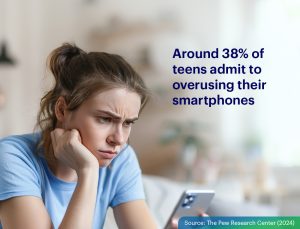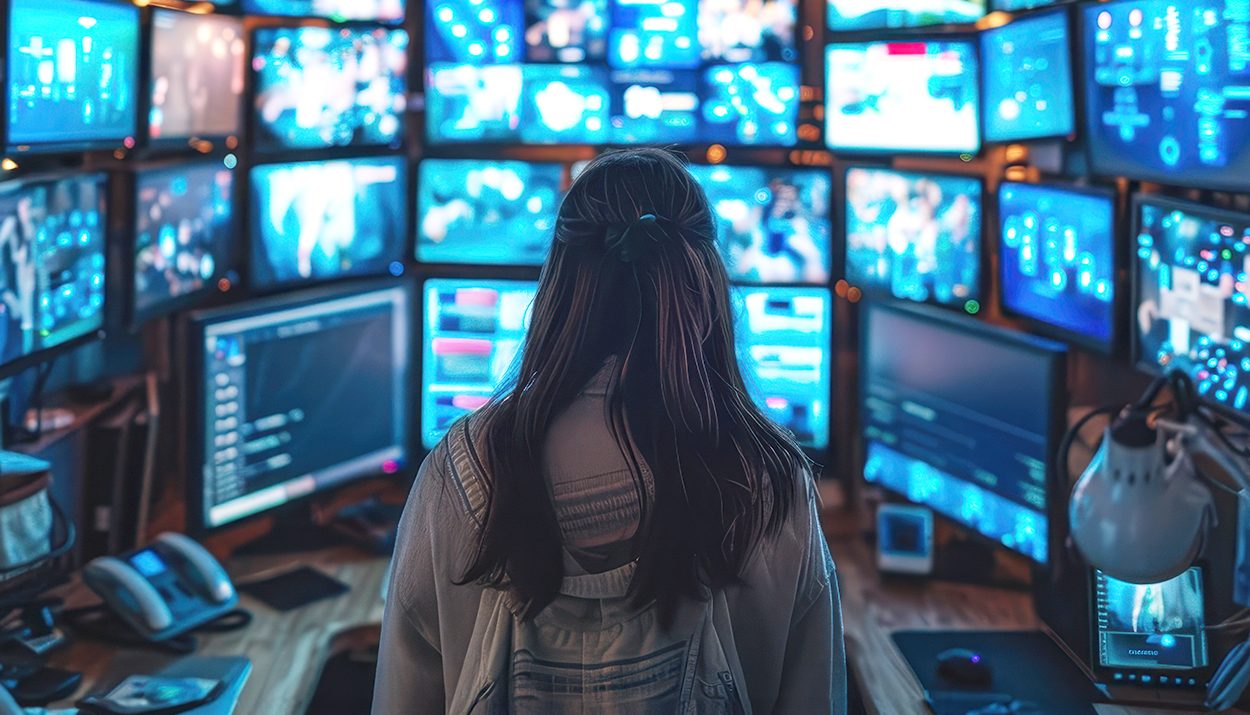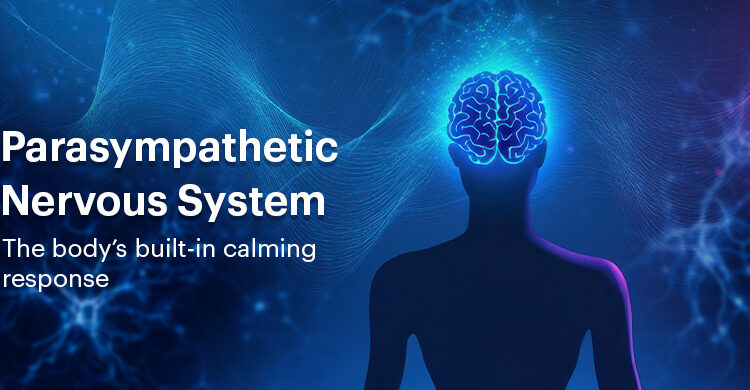Technology has become an omnipresent force in the lives of millions, especially youths. Their mornings start, and nights conclude with smartphone interactions. Social media platforms dominate much of their daytime hours. This makes it a high time for understanding the impact of technology on mental health.

The Pew Research Center’s report also revealed that the perception of spending too much time on smartphones is more evident among teenage girls. This gender difference in smartphone use and its perceived impact may point to underlying issues related to social media, body image, and mental health.
These findings are part of a broader conversation about mental health issues from social media. They highlight the need for healthier tech habits, especially among youths who are highly engaged with their tech devices – be it laptops, desktops, mobile phones, tabs, etc.
Today, as we celebrate International Youth Day, it’s the perfect time to reflect on how technology impacts young people’s health and explore ways to use it more wisely.
HOW TECHNOLOGY CONTRIBUTES TO MENTAL HEALTH ISSUES IN YOUTH
While offering numerous benefits, technology has also introduced several challenges, particularly for the youth. The pervasive use of digital devices, social media, and other online platforms has created an environment where young people are increasingly vulnerable to mental health issues.
- Algorithms Prey on Emotions: Social media algorithms are engineered to maximize engagement, often prioritizing content that triggers emotional responses, such as fear, anxiety, or outrage.This can lead to a cycle where youths are continuously exposed to stress-inducing content, further exacerbating feelings of anxiety and depression.
- Scrutiny of Digital Footprints: The phenomenon of ‘digital footprints’ adds another layer of complexity to the mental health issues from social media.Every action taken online – every post, like, or comment, leaves a trace that can be revisited and scrutinized, leading to increased self-consciousness and social anxiety. Young people may feel pressured to curate an idealized online persona, contributing to a disconnect between their online and real-world selves, which can further impact their mental well-being.
As these challenges manifest in various ways, such as digital addiction, sleep disturbances, and increased levels of anxiety and depression, it becomes essential to understand and address the underlying risks.
Doing so will help mitigate the mental health concerns that are becoming increasingly prevalent among young people in today’s digital age.
YOUTHS, MASTER TECH BEFORE IT MASTERS YOU!
At a time when technology permeates nearly every aspect of life, youths need to develop healthy habits around their digital consumption and alleviate the impact of technology on mental health. A balanced approach to technology is crucial for maintaining mental well-being, social relationships, and overall life satisfaction.
By adopting mindful practices and setting clear boundaries, youngsters can harness the power of technology while avoiding health issues due to technology:
- Setting Screen Time Limits: To prevent digital addiction and maintain a healthy balance, youths can establish clear screen time boundaries using tools like ‘Screen Time’ on iOS or ‘Digital Wellbeing’ on Android.These features help set daily app limits and track app usage hourly.Additionally, youths can practice the 20-20-20 rule: every 20 minutes, take a 20-second break and focus on something 20 feet away.Setting reminders for the ‘20:20:20 Rule’ can help youths make these breaks a regular part of their routine, reducing eye strain and boosting focus.
- Creating Tech-free Zones: Creating ‘tech-free zones’ in bedrooms, dining areas, and study spaces can encourage mindful technology use and lessen screen time. This practice helps maintain focus, reduces distractions, and fosters healthier social interactions and better sleep hygiene.
- Engaging in Offline Activities: Participating in offline activities such as sports, hobbies, or social gatherings can significantly reduce health issues due to technology.These activities provide opportunities for real-world interactions and help develop a well-rounded personality.
- Practising Digital Detox: Periodic digital detoxes, where one consciously disconnects from all digital devices for a set period, can help reset the mind and reduce dependence on technology. Youths can start with short detox breaks and gradually increase the duration as they become more comfortable with the idea.
By integrating these strategies into their daily lives, youngsters can enjoy the advantages of technology while mitigating its potential adverse effects on their mental health.
So, every youth reading this blog, please take control of your tech use, prioritize your mental health, and inspire others to do the same.
HARNESSING TECHNOLOGY FOR BETTER MENTAL HEALTH OUTCOMES
While it’s important to highlight the adverse impact of technology on mental health, it’s also crucial to recognize the significant benefits it can offer.

Digital technology, including mobile phones, Internet-connected devices, and even Artificial Intelligence (AI) can be used to reduce the negative impact of technology on mental health. By continuously collecting objective data on behavior, these technologies can provide early warning signs of mental health issues, empower individuals with actionable insights, and facilitate timely, personalized interventions.
By appropriately leveraging digital technology, youths can move towards more effective, scalable, and personalized mental health care solutions.
Want to share your healthcare journey? Join MDForLives and make your voice heard!
Your participation in our paid patient surveys can help shape better healthcare initiatives and improve patient care.
A. Royden D’Souza is a professional writer with over 5 years of experience in the healthcare industry. He holds an engineering degree and has worked with several brands to meet their content requirements. He is passionate about writing engaging content for healthcare professionals, allied healthcare professionals, and nurses.






